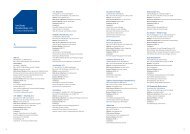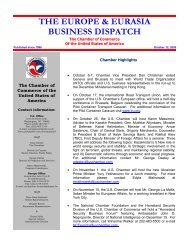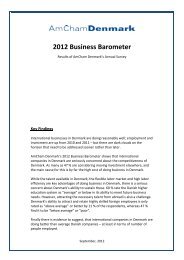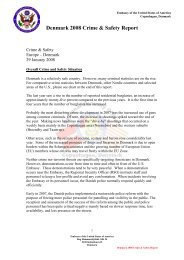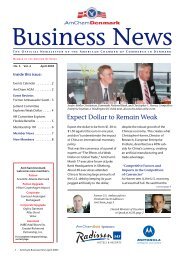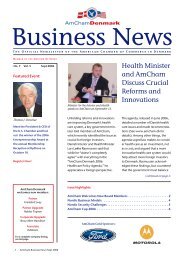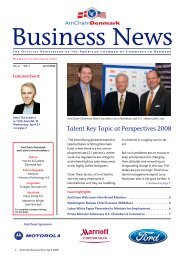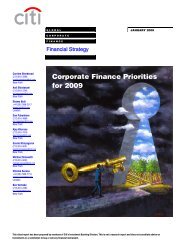Amcham yearbook 2007-Tom5 - American Chamber of Commerce ...
Amcham yearbook 2007-Tom5 - American Chamber of Commerce ...
Amcham yearbook 2007-Tom5 - American Chamber of Commerce ...
You also want an ePaper? Increase the reach of your titles
YUMPU automatically turns print PDFs into web optimized ePapers that Google loves.
Corporate taxation<br />
Tax rate<br />
Companies become liable to pay tax as soon<br />
as they have been established in Denmark.<br />
The tax rate for Danish companies and<br />
Danish branch <strong>of</strong>fices or permanent establishments<br />
is 28%.<br />
Company residence and territoriality<br />
Unlimited tax liability<br />
A resident company is a company that is<br />
incorporated and has its statutory seat in<br />
Denmark.<br />
Furthermore, a company incorporated in a<br />
foreign country maybe considered a tax resident<br />
<strong>of</strong> Denmark if it is managed and controlled<br />
in Denmark. A company resident in<br />
Denmark is taxed on its worldwide income<br />
and chargeable capital gains. However,<br />
income from foreign permanent establishments<br />
and real property situated abroad is<br />
not included in the computation <strong>of</strong> the taxable<br />
income in Denmark.<br />
Limited tax liability<br />
The income resulting from foreign companies’<br />
permanent establishments/real property<br />
located in Denmark must be included in the<br />
Danish income statement, whereas the<br />
expenses related to the activities <strong>of</strong> the permanent<br />
establishment/real property in<br />
Denmark are deductible.<br />
Danish income subject<br />
to withholding tax<br />
A tax treaty between Denmark and a country<br />
<strong>of</strong> residence <strong>of</strong> the recipient <strong>of</strong> certain types<br />
<strong>of</strong> income may provide that Denmark reduce<br />
or eliminate the withholding tax on such payments.<br />
Dividends<br />
Denmark is as a rule entitled to impose a 28%<br />
withholding for on dividends paid to foreign<br />
recipients. However, dividends from a Danish<br />
company to a foreign company are exempt<br />
from withholding tax if the following requirements<br />
are satisfied;<br />
a) The foreign parent company is resident in<br />
another EU member state or if the parent<br />
company is protected according to a double<br />
tax treaty and,<br />
b) the recipient owns at least 15% (<strong>2007</strong>) <strong>of</strong><br />
the share capital <strong>of</strong> the payer for a period<br />
<strong>of</strong> 12 consecutive months<br />
The 12-month holding period requirement<br />
may be satisfied after the dividends are distributed.<br />
Royalties<br />
Denmark is entitled to impose 30% withholding<br />
tax royalties to foreign companies.<br />
However, this rate is subject to treaty relief (it<br />
may be reduced or eliminated depending on<br />
the specific treaty).<br />
Interest<br />
Interest payments to foreign group companies<br />
can be subject to a withholding tax <strong>of</strong><br />
30%. If certain conditions are fulfilled withholding<br />
tax exemptions apply.<br />
Tax losses<br />
Tax losses may be carried forward indefinitely<br />
and can be <strong>of</strong>fset against future<br />
taxable/operating income. Tax losses cannot<br />
be carried back.<br />
Danish tax law includes an anti-avoidance<br />
provision, which may restrict the utilization<br />
<strong>of</strong> tax losses carried forward in case <strong>of</strong> a<br />
change <strong>of</strong> ownership <strong>of</strong> a company.<br />
To the extent that more than 50% <strong>of</strong> the<br />
shares/votes in a Danish company directly or<br />
indirectly is held by another shareholder than<br />
compared to a prior year in which the company<br />
has suffered a tax loss, the deductibility<br />
<strong>of</strong> such tax loss is restricted, implying that<br />
any tax loss carry forward cannot be <strong>of</strong>fset<br />
against future net financial income (i.e. interest,<br />
capital gains on bonds and shares, dividends,<br />
income from financial leasing <strong>of</strong><br />
depreciable assets etc.). It may, however, still<br />
be <strong>of</strong>fset against future operating income.<br />
In case the Danish company is without material<br />
business activity at the time <strong>of</strong> a change<br />
in ownership, cf. above, tax loss carry forwards<br />
will be lost entirely.<br />
Under this anti-avoidance provision a transparency<br />
principle applies in case a parent<br />
company owns more than 25% <strong>of</strong> the shares<br />
in the Danish company that has suffered the<br />
tax loss. In such case, the shareholders in the<br />
parent company are deemed the shareholders<br />
in the loss-making company when performing<br />
the change <strong>of</strong> ownership test. As a<br />
main rule the transparency rule does not<br />
apply to listed companies.<br />
Controlled Foreign Companies (CFC)<br />
Under the controlled foreign company (CFC)<br />
legislation, a Danish company, together with<br />
other group companies, holding at least 25%<br />
<strong>of</strong> the share capital or more than 50% <strong>of</strong> the<br />
voting power <strong>of</strong> a foreign company must<br />
include in its taxable income financial<br />
income <strong>of</strong> that controlled subsidiary if the<br />
subsidiary is primarily engaged in financial<br />
activities and is subject to low taxation. The<br />
Danish CFC registration is expected to be<br />
amended during <strong>2007</strong>.<br />
Filing <strong>of</strong> tax return<br />
As a general rule, the income year runs with<br />
the financial year and the tax return must be<br />
filed not later than 6 months after the end <strong>of</strong><br />
the income year. This means that companies<br />
with a 31 December year-end must file their<br />
tax returns by end <strong>of</strong> June in the following<br />
year.<br />
Payment and collection<br />
The corporate tax charge must be paid on<br />
account in two instalments. The dates <strong>of</strong> payment<br />
are in March and in November. The tax<br />
paid on account is compulsory for all companies<br />
established after 28 January 1998. The<br />
advance tax is 50% <strong>of</strong> the average income<br />
tax for the past three years.<br />
As new companies cannot make up advance<br />
tax on the basis <strong>of</strong> past years income, no<br />
ordinary advance tax payment is fixed. A<br />
new company may elect a voluntary payment<br />
<strong>of</strong> advance tax before 20 November in<br />
the relevant income year.<br />
Tax audits<br />
The Danish authorities perform tax audits on<br />
a number <strong>of</strong> companies and branches every<br />
year. The tax audits are not done on regular<br />
basis but are instead based on a random<br />
sampling.<br />
Penalties<br />
An interest rate <strong>of</strong> 0,5% per month will be<br />
charged on late payments <strong>of</strong> corporate tax.<br />
Such interest charges are not tax deductible.<br />
Calculation <strong>of</strong> the taxable income<br />
Taxable income is based on pr<strong>of</strong>its reported<br />
in the annual accounts adjusted to comply<br />
with prevailing tax rules. For tax purposes,<br />
several adjustments are made, primarily concerning<br />
non-taxable income, non-deductible<br />
expenses, depreciation and provisions made.<br />
Expenses incurred to acquire, ensure and<br />
maintain income are deductible on an accrual<br />
basis.<br />
Dividend income<br />
A dividend received by a Danish parent company<br />
from its Danish or foreign subsidiary is<br />
exempt from tax provided that the parent<br />
company owns 15% (<strong>2007</strong>) or more <strong>of</strong> the<br />
share capital <strong>of</strong> the subsidiary for an uninterrupted<br />
period <strong>of</strong> 12 months that includes the<br />
date <strong>of</strong> distribution <strong>of</strong> the dividends.<br />
If a Danish company holds less than 15%<br />
(<strong>2007</strong>) <strong>of</strong> the shares, then 66% <strong>of</strong> the dividend<br />
amount is taxable at the corporate tax<br />
rate <strong>of</strong> 28% (i.e. an effective taxation <strong>of</strong> the<br />
dividend at 18,52%).<br />
Capital gains and losses<br />
Capital gains and losses are generally included<br />
in the taxable income. Taxable net gains<br />
are included in the taxable income <strong>of</strong> the<br />
company for each financial period and are<br />
taxed at a rate <strong>of</strong> 28%.<br />
In addition to the assets that are described<br />
below, a complex set <strong>of</strong> rules regarding e.g.<br />
taxation <strong>of</strong> gains and losses on bonds, forward<br />
contracts, futures and options etc.<br />
exists. However, these rules are not described<br />
here.<br />
Sale <strong>of</strong> Shares<br />
Gains<br />
If shares have been owned for less then three<br />
years, the gains are taxed at a rate <strong>of</strong> 28%.<br />
Gains derived from shares owned for three<br />
years or more are generally exempt from tax<br />
unless the seller deals in shares. Special rules<br />
apply to investment companies.<br />
Losses<br />
If shares have been owned for less than three<br />
years, losses are not deductible, yet losses<br />
can be <strong>of</strong>fset against gains from the sale <strong>of</strong><br />
shares which have also been owned for less<br />
than three years. Losses incurred on shares in<br />
qualifying shareholdings are reduced by the<br />
amount <strong>of</strong> tax-free dividends received on the<br />
shares.<br />
Net losses can be carried forward indefinitely.<br />
However, losses incurred prior to 2002 can<br />
only be carried forward for five years.<br />
Losses from the sale <strong>of</strong> shares owned for<br />
three years or more are not deductible for tax<br />
purposes, unless the primary object <strong>of</strong> the<br />
seller is to trade shares.<br />
Real Property<br />
Gains<br />
Capital gains from sale <strong>of</strong> real property are<br />
tax-liable. In determining a gain, a four-step<br />
procedure must be followed:<br />
• The purchase price and the sale price <strong>of</strong><br />
the real property are adjusted to cash values.<br />
• The total amount <strong>of</strong> tax depreciation and<br />
write-<strong>of</strong>fs during the ownership period is<br />
calculated.<br />
• Tax depreciation is recaptured as the lower<br />
<strong>of</strong> (a) sales price less written-<strong>of</strong>f value and<br />
(b) accumulated depreciation.<br />
• Depreciation, losses or write-<strong>of</strong>fs, which<br />
have not been recaptured, reduce the purchase<br />
price when calculating the taxable<br />
gain on the property.<br />
A capital gain is taxed as ordinary income.<br />
However, roll-over relief is available if a new<br />
property is acquired for the use <strong>of</strong> the business<br />
prior to the end <strong>of</strong> the year following<br />
the year <strong>of</strong> disposal.<br />
Losses<br />
A loss from sale <strong>of</strong> real property is only taxdeductible<br />
if the primary object <strong>of</strong> the company<br />
is to trade real property. Yet, a loss can<br />
be carried forward to be <strong>of</strong>fset against taxable<br />
gains on real property.<br />
Christiansborg<br />
54 55<br />
Hans Henrik Tholstrup





